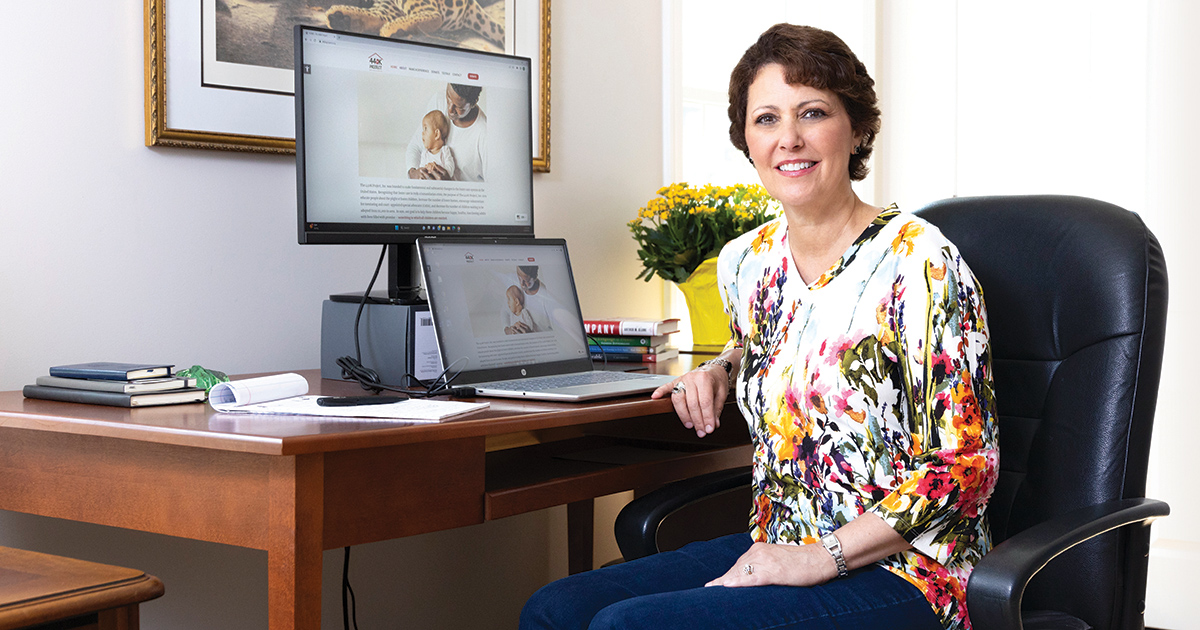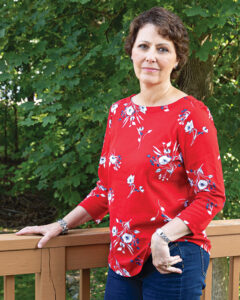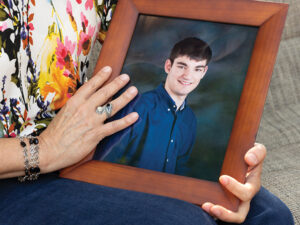Fighting for Those Too Often Forgotten

When she was in college, Sandra Bravo MBA’87 had the opportunity to mentor a 13-year-old girl in foster care. Her name was Kathy.
Mentoring sounded like a nice way to volunteer to Bravo. Perhaps, Bravo thought, she would show Kathy around her college campus.
Soon, however, Bravo realized that mentoring Kathy would not be so simple or carefree. With a mother who was a drug addict and prostitute, Kathy lived a hard, unsettled life. When Kathy visited with Bravo, the college student did all the talking. Kathy stayed quiet.

“I had no idea what foster care was about, how difficult it was,” says Bravo, associate professor of practice in marketing at Babson. “Kathy would follow me around campus, but she would never look me in the eye, and she would never say a word. I thought, ‘I am in over my head.’ ”
During one visit, Kathy noticed a cloth doll that Bravo’s grandmother had given her. Bravo let her hold it, and then she decided to let her keep it. “Her face lit up. It was like I gave her the best thing she ever had in her life,” Bravo says. “She hugged that doll so tightly, and she looked me right in the eye and she said, ‘Thank you, Sandy.’ ”
A few days later, Kathy’s mother decided that her daughter wouldn’t visit with Bravo anymore. At that moment, Bravo came to a decision. “I decided no child should suffer like this,” Bravo says, “and that one day I would adopt a child out of foster care.”
Since then, Bravo has been filled with concern for the children caught up in the foster care system. She would not only go on to adopt two foster children, J.R. and Elijah, but she also would create a nonprofit, the 440K Project, that aims to raise awareness about the problems plaguing foster care. “I want to rethink how foster care is done with the goal of helping children thrive,” Bravo says.
Even as tragedy would befall one of her children, a loss that left her raw and shaken, Bravo has remained resolute. Foster children, so often overlooked, face lives filled with challenges. Bravo can’t turn her back on them. “I think what really bothers me about foster care above everything is they are completely vulnerable,” she says. “They don’t have a voice. They are just another kid in the system.”
Rethinking Foster Care
That’s not to say that the foster care system doesn’t have good people trying to do the right thing by children, Bravo says, but statistics reveal the tough future that awaits many foster children.
Once they age out of the system, foster children face high rates of homelessness, early pregnancy, substance abuse, and incarceration. “If you look at the stats, no one would say that works,” Bravo says. “The outcomes are evidence of a system that’s dysfunctional.”
The 440K Project is named for the roughly 440,000 children in foster care in the United States. Many spend months or even years in the system before being permanently reunited with their families or adopted. “The child often gets moved from home to home,” Bravo says. “It’s a long process.”
That process can take a toll on children and can leave them traumatized and suffering from PTSD. “They often get attachment disorders because they don’t belong anywhere,” Bravo says. “They fall behind in terms of social, emotional, and educational development.”
“I think what really bothers me about foster care above everything is they are completely vulnerable. They don’t have a voice. They are just another kid in the system.”
Sandra Bravo MBA’87, associate professor of practice in marketing
Bravo knows this firsthand. She and her husband, Mike, would adopt their first child, J.R.,when he was 5 years old, after he spent four long years shuffling between his drug-addicted parents and foster homes. He first entered the system as a baby after a drug raid on his parents’ house. “When he first went into foster care at nine months old,” Bravo says, “he didn’t smile or cry or even giggle.”
For more than 20 years, Bravo owned Bravo Communications, a marketing consulting firm, but she has stepped away from it to focus on the 440K Project. She has ambitious goals for the nonprofit. First, she plans to launch a public awareness campaign about a system that many people don’t think about. “The first phase is to educate and infuriate the nation about foster care,” Bravo says. “The country needs to know. Once you know, then you have some skin in the game.”
As part of that awareness campaign, she hopes to inspire people to adopt the roughly 111,000 children waiting for adoption in foster care. “We want to try to get that 111,000 kids down to zero,” Bravo says. “I realize that’s ambitious, but that doesn’t bother me at all.”
Ultimately, she wants to gather experts together and start to rethink the foster care system so that it ensures better outcomes for children’s lives. “How can the foster care process be done differently so the child is physically, socially, emotionally well?” Bravo asks.
Help from Babson
Bravo can’t do this work alone, and she’s thankful for the team of people that supports her. The star of that team is Mike Bravo, her husband. The pair first dated in high school, and before they married, Mike surprised Bravo by revealing that he one day wanted to adopt a child, just as she did. “Mike and I have always been a team,” she says. “We’re best friends.”

Mike is on the 440K Project’s board, as are several people with Babson connections (Associate Professor Anjali Bal, entrepreneur Scott DiGiammarino ’84, and young alumna Haley Pesce ’20, who was a star student of Bravo’s). Walton Isaacson, the Culver City, California, ad agency co-founded by Aaron Walton ’83, has worked pro bono on the awareness campaign that the 440K Project hopes to launch by year’s end.
Walton came on board after Bravo gave him an emotional two-minute pitch about foster care. “When I finished, I looked at Aaron,” Bravo remembers. “He said two words: ‘I’m in.’ ”
Bravo has long been connected to Babson, having earned her MBA here, and she began teaching at the College in 2015. She is amazed by the support the Babson community has given her. “It is just the right place for me,” she says. “It has allowed me to be in a profession I love, and it has given me people who are amazingly talented who are helpful to the 440K Project.”
In particular, she calls out her fellow professors in the College’s Marketing Division. When the unimaginable happened, and Bravo’s days filled with sadness and grief, they stepped in, bringing her food and covering her classes. During a dark time, they were there. “I cannot tell you how grateful I am,” Bravo says.
Compelled to Do This
When the Bravos welcomed J.R. to their family, fulfilling a dream that both Sandy and Mike had to adopt a child, the couple loved and supported him. As the years passed, J.R. became a fisherman, a skier, and a pilot. He was kind and funny.
Life, though, was not easy for him. “He had a lot of social and emotional issues,” Bravo says. “He struggled with the trauma he experienced in the first years of his life.” J.R. had trouble with eye contact, even with Bravo, but he often put his arm around her shoulder and said, “Mom, you need to fix foster care.”

J.R. passed away on March 8, 2022, of a drug overdose. He was 24. “He took one pill,” Bravo says. “It was laced. It killed him.”
In the painful days that followed, Bravo doubted her work with foster care. How could she ask others to adopt a foster child, she wondered, when she knows how traumatized they are? “I was at the lowest point in my life,” she says. Her husband told her something that kept her going: “Every child deserves a chance.”
Her grief remains, but Bravo has toughened her resolve. “Steel your mind,” she tells herself and keeps a notecard with “steel your mind” written on it by her desk in Malloy Hall. “Steel is one of the strongest substances on earth,” she says.
Attempting to change foster care is obviously a staggering challenge. The system is expansive and bureaucratic, and the stakes are high, involving the lives of children in troubling circumstances. For inspiration, Bravo looks to her heroes, people such as Candace Lightner, the founder of Mothers Against Drunk Driving, who helped change laws and the culture of the country surrounding drunk driving. “I look to people like that, and how they had an impact on the world in a huge way,” she says. “I am in awe of them.”
Bravo also thinks of J.R., of his arm around her shoulder, of how he kept telling her to fix foster care. “I feel like this is what I was meant to do. I feel compelled to do this,” she says. “This is my chance to help these kids.”
Watch Sandra Bravo MBA’87 discuss her experiences with foster care at this year’s TEDxBabsonCollege.
Posted in Community, Entrepreneurial Leadership, Outcomes




